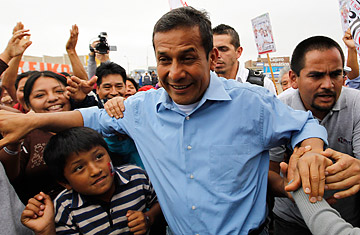
Peru's presidential candidate Ollanta Humala greets supporters during a campaign rally in Chilca, southern Lima, May 26, 2011.
Peru is a mining country. Mining accounts for far more than half of the country's exports; taxes paid by mining companies equal more than 10% of the government's annual budget. Peru is the world's top silver producer, second in copper and in the top six of a long list of other metals, including gold. So, when someone tinkers with mining — or even talks about tinkering with it — the country's economic drivers go haywire.
President-elect Ollanta Humala, who squeaked to a narrow victory in Sunday's voting against Congresswoman Keiko Fujimori — he had 51.3% of the vote with 90% of the ballots counted — found out quickly just how touchy mining investors can be.
Humala's original campaign platform talked about mining and other natural resources as strategic sectors that needed to be in the service of the state. The plan included a windfall tax on mining and allowing local communities to reject mining or oil and gas concessions through referendums. As it became clear that Humala was about to become Peru's next president, those three planks spooked investors.
Peru's stock market, which is top-heavy with mining companies, plunged as soon as it opened Monday morning. It nosedived nearly 9% in a matter of minutes and trading was halted. It then reopened but closed early when the selloff went viral. The General Index fell 12.5%, the worst one-day drop in the bourse's history. Meanwhile, the local currency, which had gained more than 2% on the U.S. dollar in May, its largest in 18 months, lost 1.2%.
Adding to the hysteria was the fear that Humala might be an acolyte of Venezuelan President Hugo Chávez. As a result, confidence dissipated in the country's growing economy — at nearly 9%, one of the fastest in the world. At risk, it seemed, would be tens of billions of dollars in mining and oil and gas projects on the drawing board.
Lost in the sell-off was Humala's apparently successful attempt to sell himself to the electorate as a much more moderate candidate than his reputation presupposed. Indeed, the former military man is not the same candidate who presented the lengthy, left-wing campaign platform last December. He is not even the same candidate who won the right to compete in Sunday's run-off by coming in with the most votes in a first round of voting in April. "He has been evolving and modifying his views," says Manuel Torrado, of the DATUM polling firm.
Indeed, by April, the Humala campaign had presented a watered down version of its platform; and in May he unveiled a "road map" that he said would be the basic architecture of his government that made no mention of "strategic sectors" or the state's need to have a guiding role in the economy. He also took a pledge on the Bible not to deviate from the general political and economic framework that has apparently led to Peru's dramatic growth. Humala's revisions received the strong support of former President Alejandro Toledo (2001-2006) and Mario Vargas Llosa, who won the Nobel Prize for Literature last year. Both, in all likelihood, contributed to the little bump Humala needed to win.
Vargas Llosa had earlier called a runoff between Humala and Fujimori the equivalent of choosing between terminal cancer and AIDS, so his embrace was, though largely symbolic, important nonetheless. In an interview with local TV from Spain, the novelist (and former presidential candidate himself) called on investors to share his faith in Humala. Meanwhile, Toledo, whose party has 21 seats in Congress and can give Humala the majority he will need to pass legislation, probably helped Humala in more concrete terms. The ex-President had been a candidate in the first round of voting but had lost resoundingly. Nevertheless, his endorsement of Humala may have convinced much of the 15% of voters he won to throw their support to Humala. Now, apart from a congressional alliance, most of Toledo's economic advisors are part of the Humala team.
Still, close to half of the electorate voted against Humala and he now has to convince them and Peru's investors, that he is ready to govern and to keep the economy growing. Cecilia Blume, who was the key figure in the Toledo government's economic team, said Humala has to announce three or four ministers this week if he wants to get off on the right foot. "The country can't deal with several days of massive selloffs on the stock market. Humala needs to transform now from candidate and opposition leader to president elect," she said. "Right now he seems to be improvising, which is not good for calming the market."
Blume and other analysts say the first thing Humala has to do is name his finance minister now. There is a seven week transition before Humala takes office on July 28 and then slightly more than one month before his administration has to present the 2012 budget. By law, the budget needs to be sent to Congress by Aug. 31.
The Humala camp has called the post-election jitters unfounded. Felix Jimenez, his chief economic advisor, said there would be no major changes in economic policy. Humala himself, addressing supporters near midnight on election day, promised a consensus government that will not stray from free-market policies — though he did not stray from his social agenda either. "We are going to correct economic policy so that growth is not based on trickle down, but real policies that solve the problems of education, health care and infrastructure," he told cheering supporters. It is a fine line he will have to walk. He needs to reach out to opponents, but he risks alienating his core supporter if he strays too far from his original platform.
